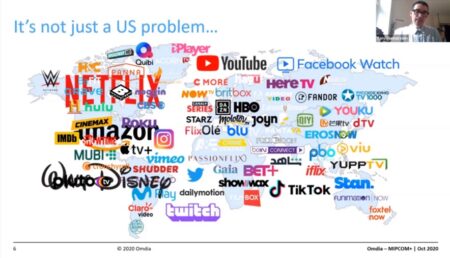The annual MIPCOM market was organized in mid-October as a virtual event. We composed a summary on what is happening in the TV industry at the moment:
1) COVID-19 transformed television for good
The topic that we could not avoid even in MIPCOM was the global pandemic and how it has affected the television industry. While many of those productions that halted in spring and early summer are now back in business, their release dates have been pushed further. In addition to schedules, COVID-19 has also had an impact on the actual contents. As Virginia Mouseler from The WIT pointed out, there is now a bunch of program formats using the idea of masking. These include, for example, The Masked Singer, A Star in a Star and Famemaker.
However, what was even more interesting was the discussion on the permanent impacts the pandemic will have on television production, distribution and consumption. Tim Mulligan from MIDiA Research stated that the TV show formats and business models most resilient to the pandemic will be virtual/online and scalable, include a consistent supply of content and use CGI/game engine production software and set design. For example, Unreal Engine, presented by Sallyann Houghton from Epic Games, can be used in creating virtual sets which are edited in real time and saved for later use. As a result, productions are less dependent on actual locations and the production process as a whole can be streamlined. Game engines also contribute to converging previously separate areas of entertainment industry, as they are not only used in game industry, but also in car design, architecture etc.
2) Streaming services strengthen their foothold
According to Tony Gunnarsson from OMDIA, 2020 is a milestone year for TV and video: for the first time, more people are subscribing to online video than pay-TV and multiple next-generation US streaming services (e.g. Disney+, Apple TV+, HBO Max, Paramount+) entered the market. Online video has thus become a fiercely competitive marketplace. As a result, Gunnarsson says, streaming services are relying more than ever on partnerships with telecom operators and pay-TV distributors to survive. Also, as Guy Bisson from Ampere Analysis and Haley Bull from 3Vision state, studios increasingly distribute content through their own platforms. We can say that COVID-19 has boosted the success of streaming services, and, says Tim Mulligan, increased streaming will persist.
3) “Diversity sells”
#metoo and #blacklivesmatter campaigns have inspired a lively discussion on diversity in the TV industry and, gradually, words are turning into actions. While diversity has not really been a pitching argument, academic research has for decades called attention to the ways in which various ethnic and cultural minorities are represented in media. Also, public service broadcasters have aimed at providing equal service for different groups of people. But it is only now that diversity appears interesting from the business point of view. We have already seen series about autism (e.g. On The Spectrum from Israel and Atypical on Netflix), but there is more to come. Nicole Zamanzadeh from Parrot Analytics introduced a study showing that demand for diverse (here referring to talent diversity) shows has surpassed the demand for non-diverse shows in the US. As Guy Bisson from Ampere Analysis summarizes: “Diversity sells”.
The virtual event gave MIPCOM attendees new possibilities to schedule their week and get back to the recordings when they felt convenient. However, MIPCOM is first and foremost a trade market, where networking and socializing play a major role. Thus, the questions arises, what is gained and what is lost in a virtual trade event?
Heidi Keinonen (DSocSci) is co-founder at Medialogi Ltd, media research and consultancy company, and Senior Research Fellow in Media Studies at the University of Turku, Finland. She has previously published articles on television-based multi-platform productions, television history, television drama, television aesthetics and transnational audiences as well as a monograph on television programme formats (Televisioformaatti ja kulttuurinen neuvottelu, Jyväskylän yliopisto 2018). Her texts have appeared in journals such as Media History, Media, Culture, and Society and Critical Studies in Television. Her current research project examines the ways in which a small national television industry adapts to the challenges of globalization.
Eerika Vermilä is co-founder at Medialogi Ltd. (media reasearch and consultancy company) and independent drama producer. For more than 25 years, she has been working in film and television business mostly in international production companies based in Finland. Vermilä has produced thousands of hours of TV entertainment format shows as well as drama series. She also has experience in running one of the most successful production companies in Finland. In addition to these her self-taught career includes a short visit to learn about the commissioner’s work in a big commercial TV channel. Recently, she has been involved in producing high-end Finnish drama series for international markets.
Twitter handle: @MedialogiOy






